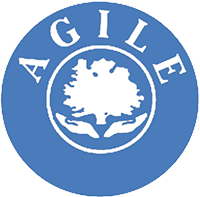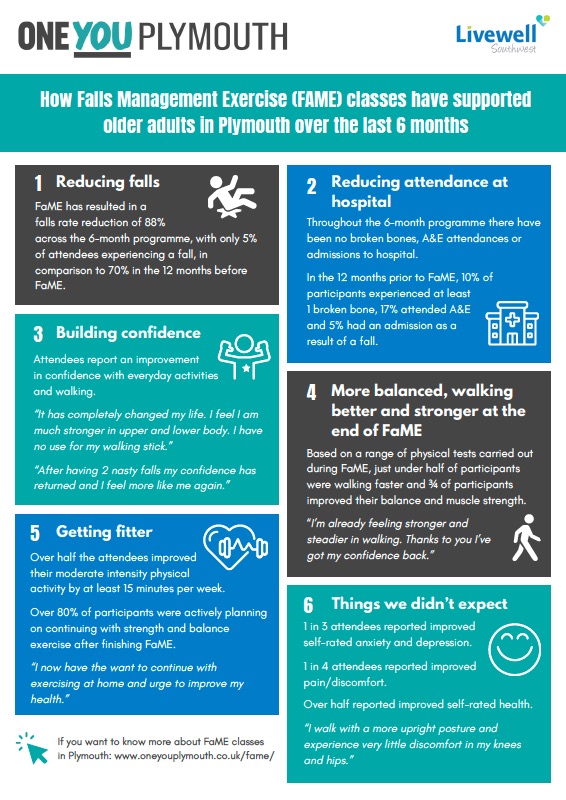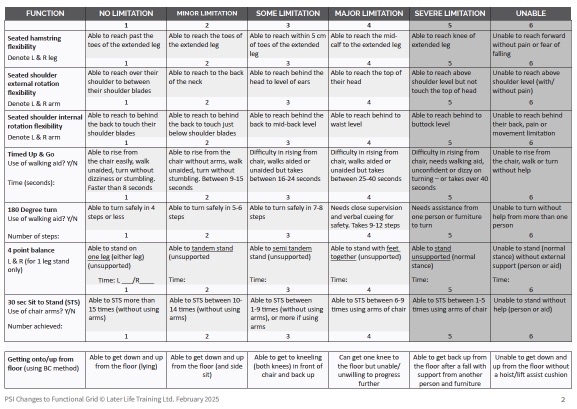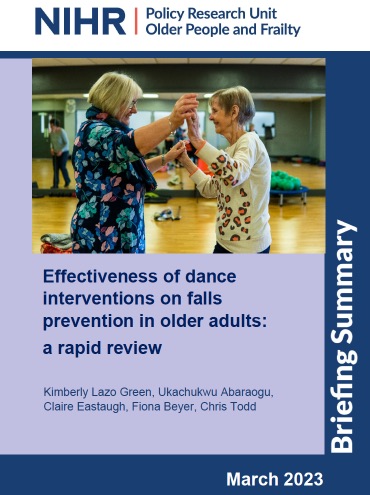Although all LLT courses are all based on evidence based exercises and delivery from published research, it is important to know how adaptations from the original delivery plan work in different settings across the UK. The following papers/abstracts/reports have been either presented at National or International Conferences or presented to funders of services to show evidence of translational effectiveness. If you are part of a service that has evaluated the effects of your PSI/EfS/OEP/CBE sessions and your documents are not available below, please do send them into the LLT office.
To view a recent set of slides delivered by LLT to the EC funded ProFouND (Prevention of Falls Network for Dissemination) project click here.
 Service Evaluations, Published abstracts and other testimonials to the delivery of PSI in practice
Service Evaluations, Published abstracts and other testimonials to the delivery of PSI in practice
If you are part of a service that has evaluated the effects of your PSI sessions and your documents are not available below, please do send them into the LLT office.
Published Research and Policy Reports citing PSI Exercises as the Intervention
In 2019, Public Health Wales published their Guidance for Recommending Exercise for Older People to Reduce Falls Risks and recommended FaME (PSI) for both primary and secondary prevention of falls.
In 2018, Public Health England published their Cost-effective Commissioning resource to show the positive return on investment of commissioning a PSI or Otago programme for falls prevention.
Also in 2018, a Logic Model showing how FaME (PSI) works in practice was published. Logic models provide us with a visual representation of how a programme is supposed to work by documenting a series of assumptions and articulating the causal relationship between 5 key components; inputs, activities, outputs, outcomes (short/medium and long term) and causal mechanisms. A logic model presents the ‘theory of change’ that is assumed/theorised to occur in response to inputs and activities, which will then lead to the outcomes the programme is intending to achieve. Read more here.
In 2017, Pubic Health England published their Falls and Fractures Consensus Statement and Resources Pack. Within this they cite FaME (PSI) and Otago (OEP) as cost effective interventions to reduce falls and encourage commissioners to consider these evidence based interventions in their service delivery.
In 2013, Age UK have published an Expert Series on Falls Prevention. This document, aimed at Commissioners of Services, recommends PSI and OEP as evidence based training and supports the roll out of proper duration, evidence based exercise with trained instructors. Click here to view.
In 2012, the Royal College of Physicians produced a report entitled “Older people’s experiences of therapeutic exercise as part of a falls prevention service 2011: Patient and public involvement where one of the main findings was that there is still a need for the delivery of evidence-based exercise in falls prevention. They report that only 54% of sites had staff who had completed Postural Stability Instructor (PSI) training and 41% of sites had staff who have completed Otago (OEP) training. To read the report and recommendations. Click here or the RCP website to view.
Evidence for the use of FaME/PSI exercises in patients with Parkinson’s Disease has been published in J Neurol Neurosurg Psychiatry in 2011 and an economic evaluation of the intervention in BMC Health Services Research in 2012. Further information on the positive benefits of PSI for people with Parkinson’s Disease can be found here.
In 2011, the Chartered Society of Physiotherapists launched a call to action to physiotherapists – Respond to the first fracture; prevent the second. One of LLT’s Directors, Prof Dawn Skelton, contributed to the document. The document provides really useful up to date costs of fractures and falls in the UK and a case study of a service that uses PSI trained physiotherapists and exercise instructors. Click here to view.
In 2010, the Centre for Disease Control in the USA published its 2nd Edition of its Falls Compendium. The PSI sessions are cited as a best practice model (p24-27). Click here to view.
In 2009, the Department of Health published its Prevention Package. Alongside recommendations for effective falls and bone health screening, were guidelines on how to best implement effective falls prevention exercise. PSI and OEP sessions were recommended. Click here or the DoH website to view.
In 2005, Guidelines for Exercise Programming for the Frail Elderly were published by the Better Ageing Collaborative, based on the results of the European Commission Framework V Better Ageing Project. The project used the FaME programme (PIS) as the basis of the exercise intervention and the original protocol for the FaME exercise intervention is cited. Click here to view.
Published Papers
In 2018, Edinburgh Leisure published a large service evaluation they had performed on their 16 week sessions. This paper, published in Disability and Rehabilitation, showed significant improvements in function, confidence and quality of life. Read more about this here.
In 2015, researchers in Hong Kong evaluated their community FaME(PSI) classes and published their results showing improvements in balance, walking speed and reduced fear of falling. Read their paper here.
Published Abstracts
These are published abstracts presented at National/International Conferences to show the effectiveness of the delivery of PSI exercises. These are not the original research abstracts upon which the PSI course is based, these can be found in the Evidence Section in the Resources Menu on the website.
In 2012, Sheena Gawler (LLT Development Lead) presented an abstract at the 8th World Congress on Active Ageing (Glasgow) about the standardisation of PSI delivery necessary for research (and practice). Click here to read the abstract.
Also in 2012, The ProAct65+ Research Team presented a workshop on the ongoing trial of PSI vs OEP vs Usual Care on habitual physical activity in older people recruited through GP practices. You can read more about the trial and the abstracts from the 8th World Congress on Active Ageing Workshop here.
Finally, Bex Townley (LLT Development Coordinator) also presented an Invited Lecture at the 8th World Congress on Active Ageing. Her lecture covered the Carmarthenshire Integrated Model for Falls Exercise Provision. You can read a precise of her lecture here.
Posters Presented at Conferences
In 2010, Gaynor McGrath presented a poster at the International Falls Conference on the reduction in Fear of Falling that occurred with 12 weeks of PSI led exercise within the Greater Glasgow and Clyde Falls Service. Click here to view the poster.
In 2005, Susie Dinan presented a poster at the International Falls Conference on the positive outcomes of the Falls Exercise Service in Camden and Islington. Click here to view the poster.
Service Evaluations
(If you have a service evaluation you would like to share, please send it to LLT)
These are reports that have been submitted to funders/commissioners of services to show the effectiveness of the delivery of PSI sessions.
In 2018, Edinburgh Leisure published a large service evaluation they had performed on their 16 week sessions. This paper, published in Disability and Rehabilitation, showed significant improvements in function, confidence and quality of life. Read more about this here.
In 2018, Hanover Housing published a short report on FaME/PSI groups in their developments.
In 2017, Gateshead Older Peoples Assembly published a Return On Investment report showing that their ‘Staying Steady’ exercise classes (delivered by PSIs based on the FaME programme for 20 weeks) at a cost of £120 per head to deliver, the return that is achieved for every £1 of public health money spent is £50.59.
In 2016, Sarah Warren MCSP from the Good Neighbours: Support for the Older Generation Project, published a pilot study and evaluation of FaME classes for people with dementia.
In 2012, Aberystwyth University and Betsi Cadwaladr University Health Board performed a favourable evaluation on the “Functional and Psychological Changes During a Community Based 32 Week Postural Stability Training Programme: Recommendations for Future Practice“ . Click here to read more.
In 2009, Leslie Goldie and Margaret Anderson presented an evaluation of the Greater Glasgow and Clyde Falls Exercise Service to the CORE conference in Glasgow. Their presentation can be viewed here
Also in 2009, Dawn Skelton and Fiona Neil, at Glasgow Caledonian University, evaluated the falls and bone health service for Greater Glasgow and Clyde. Within the service, the exercise programme is led by PSIs. Read the evaluation here.
In 2004, The Wiltshire Health promotion service was cited as a model of good practice in its work with PSIs to ensure good practice in evidence based exercise provision in their falls service. Click here to read more about the best practice model.
In 2001, The Birchwood Falls Management Programme published their interim Report to the Warrington Health Partnership. The author, Carole Rowlinson, discusses the considerable participant improvements with a chair based version of the PSI course.
Workshop abstracts
These are published abstracts where a Workshop showcasing PSI exercises has been requested by the Conference Organising Committee.
In 2012, A PSI/OEP Workshop was showcased at the 8th World Congress on Active Ageing in Glasgow (August). Click here to view the Workshop Abstract.
Video links to older peoples perspectives of PSI classes
A lovely brief video about the benefits that older people have felt from the Wrexham Strength and Balance PSI classes can be viewed here.
Great YouTube clips of some feedback from participants at a PSI class in kent
also on vimeo.
 Service Evaluations, Published abstracts and other testimonials to the delivery of EfS in practice
Service Evaluations, Published abstracts and other testimonials to the delivery of EfS in practice
If you are part of a service that has evaluated the effects of your EfS sessions and your documents are not available below, please do send them into the LLT office.
Published Research and Policy Reports citing EfS Exercises as the Intervention
The EfS course is recommended in the Best Practice Guidance for the Development of Exercise after Stroke Services in Community Settings, November 2010, which can be downloaded from the Exercise After Stroke Website. This website is part of a Scottish Government funded project to scope the provision of Exercise after Stroke services across Scotland and to provide best practice guidelines for Exercise after Stroke.
Published abstracts
These are published abstracts presented at National/International Conferences to show the effectiveness of the delivery of EfS exercises. These are not the original research abstracts upon which the EfS course is based, these can be found in the Evidence Section in the Resources Menu on the website.
In 2012, at the 8th World Congress on Active Ageing, Glasgow, Sheena Gawler (LLT Development Lead) and Martin Thompson (EfS Instructor) presented an abstract on the effectiveness of the EfS programme in Camden. Click here to view the abstract.
Service Evaluations
These are reports that have been submitted to funders/commissioners of services to show the effectiveness of the delivery of EfS sessions.
The Abstract presented at the 8th World Congress (previous section) was a service evaluation that showed beneficial effects of EfS delivery to stroke survivors.
Wiltshire EfS Service (Public Health) Evaluation showed that in the initial 14 weeks of the EfS programme (n=49 people) there was a significant improvement on 10m walk time (32% improvement), timed up and go (29% improvement), SIS mobility (3.4%), SIS recovery (12%) and SF12 physical health (5%). s. It also shows that over a longer time period (up to 26 weeks) there is a consistently improving profile of quality of life measured on the Stroke Impact Scale (SIS). It is also important to note that mental health aspects of the SIS also improved (such as Mood and Emotions and Memory and Thinking) so this infers that the exercise is having more than just a physical benefit to these stroke survivors.
Country Durham and Darlington NHS Foundation Trust showed an average 40% improvement in Timed Up and Go and the participants reported huge benefits to strength and mobility.
Workshop abstracts
These are published abstracts where a Workshop showcasing EfS exercises has been requested by the Conference Organising Committee.
In 2012, An EfS Workshop was showcased at the 8th World Congress on Active Ageing in Glasgow (August). Click here to view the Workshop Abstract.
Press and other articles
An article about the setting up of an EfS class with funds from Different Strokes and The Big Lottery Fund he offers free attendance to his classes. Read the article published in Physiotherapy Frontline.
 Service Evaluations, Published abstracts and other testimonials to the delivery of OEP in practice
Service Evaluations, Published abstracts and other testimonials to the delivery of OEP in practice
If you are part of a service that has evaluated the effects of your OEP sessions and your documents are not available below, please do send them into the LLT office.
Published Research and Policy Reports citing OEP Exercises as the Intervention
In 2018, Public Health England published their Cost-effective Commissioning resource to show the positive return on investment of commissioning a PSI or Otago programme for falls prevention.
In 2017, Pubic Health England published their Falls and Fractures Consensus Statement and Resources Pack. Within this they cite FaME (PSI) and Otago (OEP) as cost effective interventions to reduce falls and encourage commissioners to consider these evidence based interventions in their service delivery.
In 2013, Age UK have published an Expert Series on Falls Prevention. This document, aimed at Commissioners of Services, recommends PSI and OEP as evidence based training and supports the roll out of proper duration, evidence based exercise with trained instructors. Click here to view.
In 2012, the RCP produced a report entitled “Older people’s experiences of therapeutic exercise as part of a falls prevention service 2011: Patient and public involvement where one of the main findings was that there is still a need for the delivery of evidence-based exercise in falls prevention. They report that only 54% of sites had staff who had completed Postural Stability Instructor (PSI) training and 41% of sites had staff who have completed Otago (OEP) training. To read the report and recommendations, click here.
In 2009, the Department of Health published its Prevention Package. Alongside recommendations for effective falls and bone health screening, were guidelines on how to best implement effective falls prevention exercise. PSI and OEP sessions were recommended. Click here to view.
Published abstracts
These are published abstracts presented at National/International Conferences to show the effectiveness of the delivery of OEP exercises. These are not the original research abstracts upon which the OEP course is based, these can be found in the Evidence Section in the Resources Menu on the website.
In 2012, at the 8th World Congress on Active Ageing, the ProAct65+ Research Team presented a workshop on the ongoing trial of PSI vs OEP vs Usual Care on habitual physical activity in older people recruited through GP practices. You can read more about the trial and the abstracts from the 8th World Congress on Active Ageing Workshop here.
Also at the World Congress, Helen Hawley presented a workshop on the Implementation of OEP in NHS Rotherham. Click here to view the abstract.
Service Evaluations
These are reports that have been submitted to funders/commissioners of services to show the effectiveness of the delivery of OEP sessions.
In 2010, Lesley Yarrow and Jean Nelson presented a lecture on a service evaluation of their OEP programme in Forth Valley, at the National Falls Conference. Click here to view the evaluation.
Ealing Public Health, through the Better Care fund, commissioned Active Ealing to develop and deliver a one year pilot programme to improve strength and balance function in older adults aged over 65, aiming to reduce hospital admissions due to falls. The budget for this 12 month pilot intervention was £80,000. Due to the success of the pilot, Public Health re-commissioned Active Ealing to deliver a further 17 Get Up and Go programmes between April and the end of September 2015 based on the same delivery specification that required delivery of 30 programmes in year 1 making 47 in total. Read the report by Peter Clarke, 2015.
Workshop abstracts
These are published abstracts where a Workshop showcasing OEP exercises has been requested by the Conference Organising Committee.
In 2012, A PSI/OEP Workshop was showcased at the 8th World Congress on Active Ageing in Glasgow (August). Click here to view the Workshop Abstract.
 Service Evaluations, Published abstracts and other testimonials to the delivery of CBE in practice
Service Evaluations, Published abstracts and other testimonials to the delivery of CBE in practice
If you are part of a service that has evaluated the effects of your CBE sessions and your documents are not available below, please do send them into the LLT office.
Published abstracts
These are published abstracts presented at National/International Conferences to show the effectiveness of the delivery of CBE exercises. These are not the original research abstracts upon which the CBE course is based, these can be found in the Evidence Section in the Resources Menu on the website.
In 2012, at the 8th World Congress on Active Ageing, Carolyn Wilson from the Perth & Kinross Care Home Activity Network, presented the success of the CBE exercises within the Network. Click here to read the abstract.
More published service evaluations appear below.
Service Evaluations
These are reports that have been submitted to funders/commissioners of services to show the effectiveness of the delivery of CBE sessions.
In 2009, the East Anglian Daily Times published an article about the benefits of chair based exercises and a case study. The classes, run in Suffolk, have had fantastic results for local older people. Click here to read the article.
In 2004, Nursing Older People published an article about the Weymouth and Portland project and the use of Chair Based Exercise Leaders within the service. Click here to read the evaluation.
In 1999, a paper published in Physiotherapy Theory and Practice by Alison Allen and Janet Simpson, describes use of CBE leaders within a primary care service. Click here to read the evaluation.
Evaluations of CBE training
In 2010, LLT ran an update CPD day for CBE leaders. Active Hastings provided a report on the training, including an evaluation by the candidates. View the report.
In 2002, The Health Promotion Agency Northern Ireland published a favourable evaluation of the CBE course.
Workshop abstracts
These are published abstracts where a Workshop showcasing CBE exercises has been requested by the Conference Organising Committee.
In 2012, A CBE Workshop was showcased at the 8th World Congress on Active Ageing in Glasgow (August). Click here to view the Workshop Abstract.
Dawn Skelton
See About Us, Staff for further information







